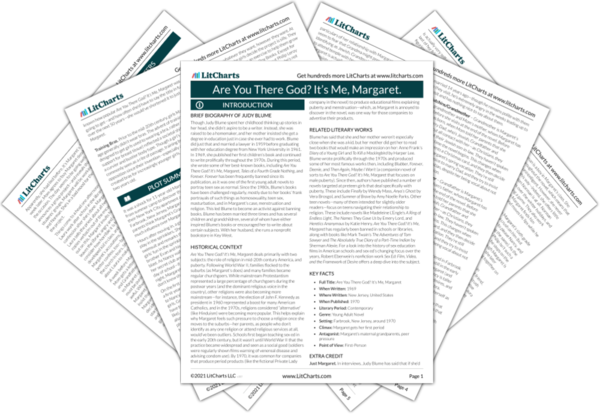Puberty
Are You There God? It’s Me, Margaret follows 11-year-old Margaret over the course of her sixth-grade year, which she starts just after her parents move the family from New York City to the New Jersey suburbs . When she arrives, Margaret is just beginning puberty, and she’s both anxious and excited about puberty’s physical changes. She constantly wonders if she’s going to develop “normally,” which she defines as growing into a 32AA bra and starting…
read analysis of PubertyFriendship, Fitting In, and Social Pressure
On the day that 11-year-old Margaret and her parents move to Farbrook, Margaret meets her first new friend, Nancy. Within days, Margaret is drawn into Nancy’s circle, becoming friends with Janie and Gretchen. The four of them form a secret club called the Four PTS’s (Pre-Teen Sensations). As the year progresses, the girls’ club meetings consistently revolve around boys and puberty, and Margaret finds that she often has to dress a certain way…
read analysis of Friendship, Fitting In, and Social PressureReligion
When 11-year-old Margaret and her parents move from New York City to Farbrook, New Jersey, Margaret experiences a shock: unlike in New York, everyone in Farbrook classifies people by their religion. Margaret’s Jewish Dad and Christian Mom have purposefully raised Margaret without religion, so this poses a problem for her: though she talks to God privately, she doesn’t attend religious services. And part of fitting in and being “normal” in Farbrook, according to Margaret’s friends…
read analysis of Religion
Family Conflict
Margaret’s parents have fraught relationships with their own parents, which creates a lot of tension in her family. Margaret’s Mom, for instance, hasn’t spoken to her parents for 14 years; they disowned her because she married a Jewish man (Margaret’s Dad). Meanwhile, Margaret’s paternal grandmother, Grandma, is also a source of friction, since Margaret’s parents believe that Grandma has too much influence on Margaret. This, in Margaret’s understanding, is one of…
read analysis of Family Conflict






